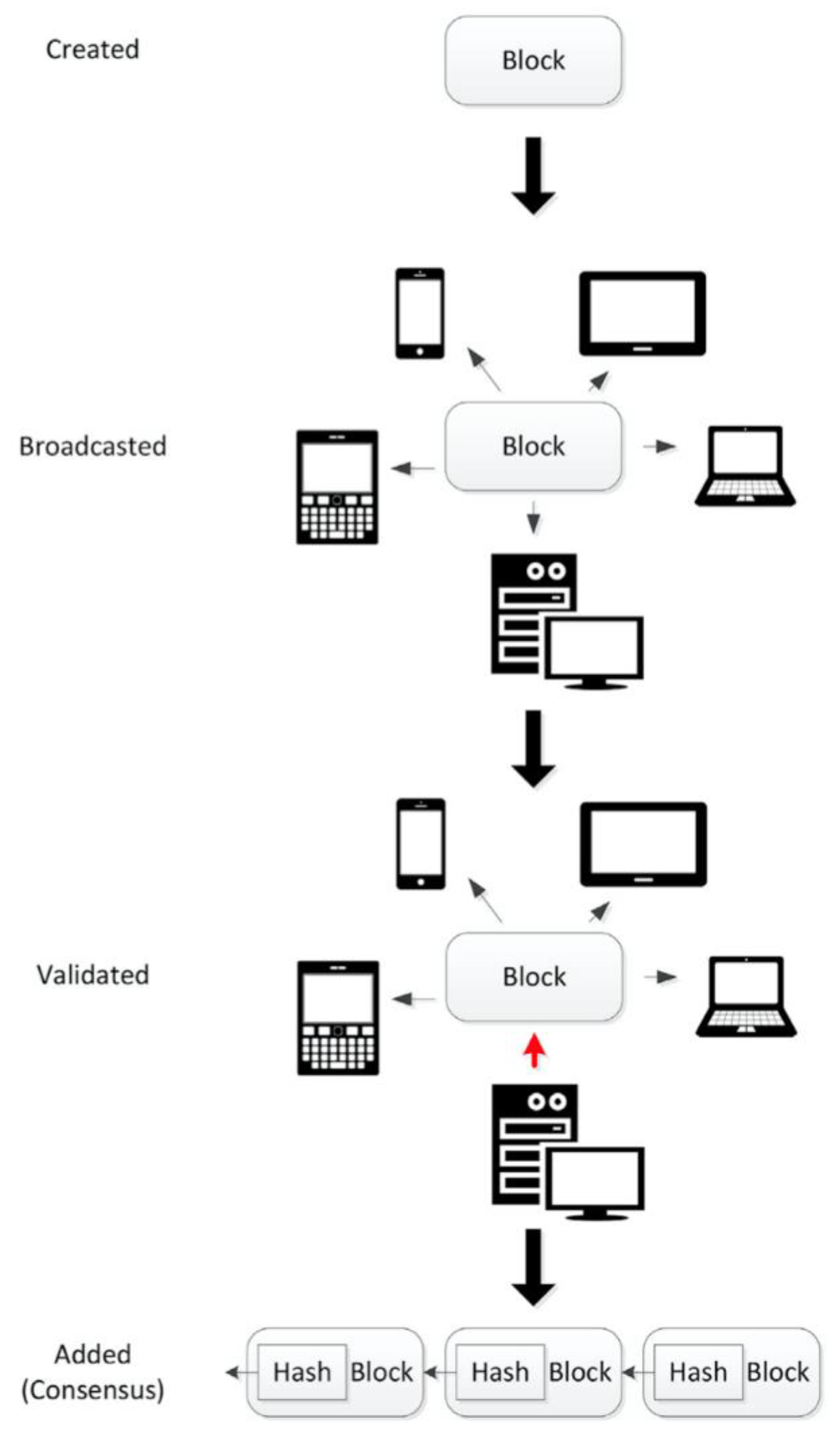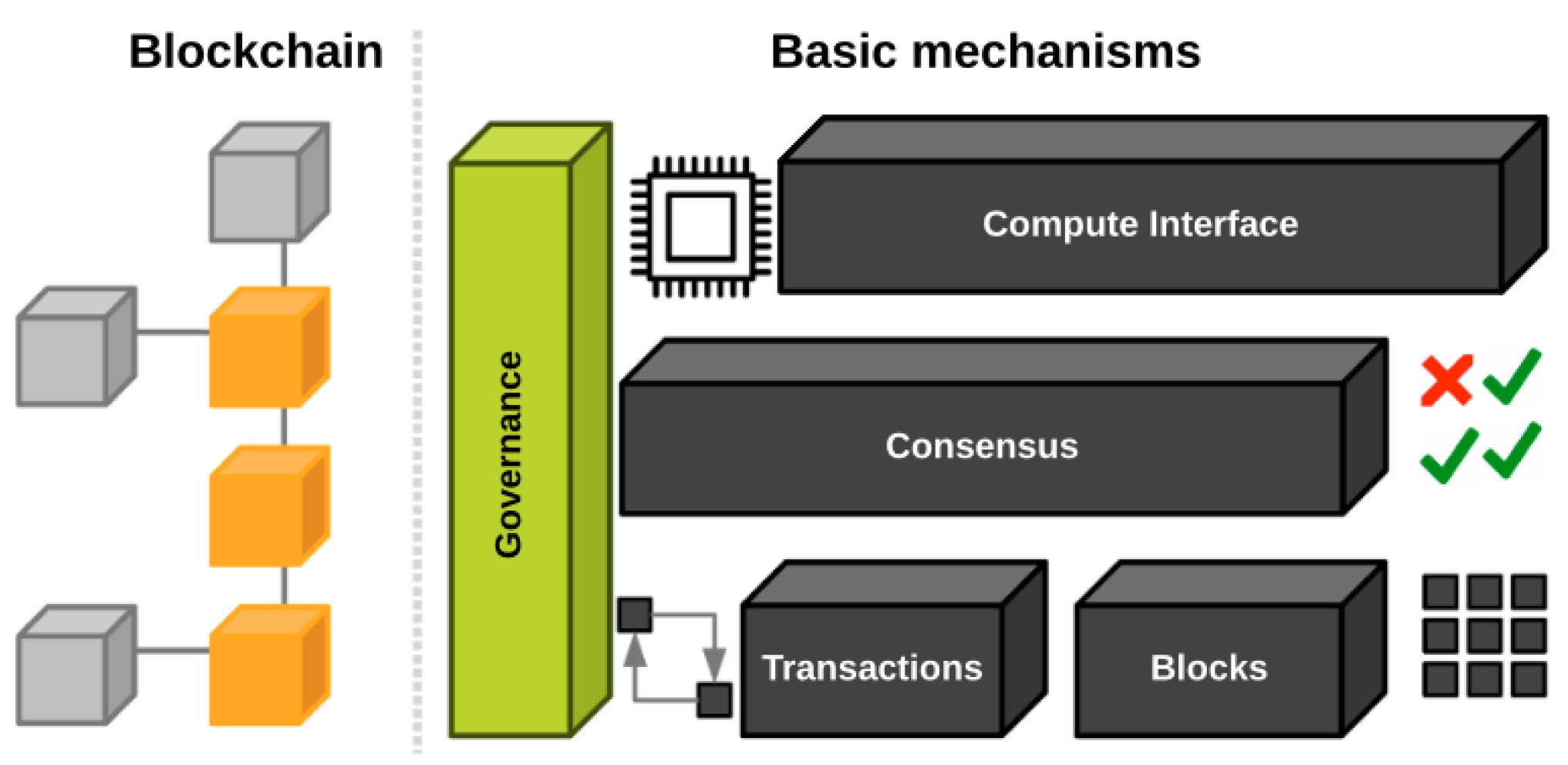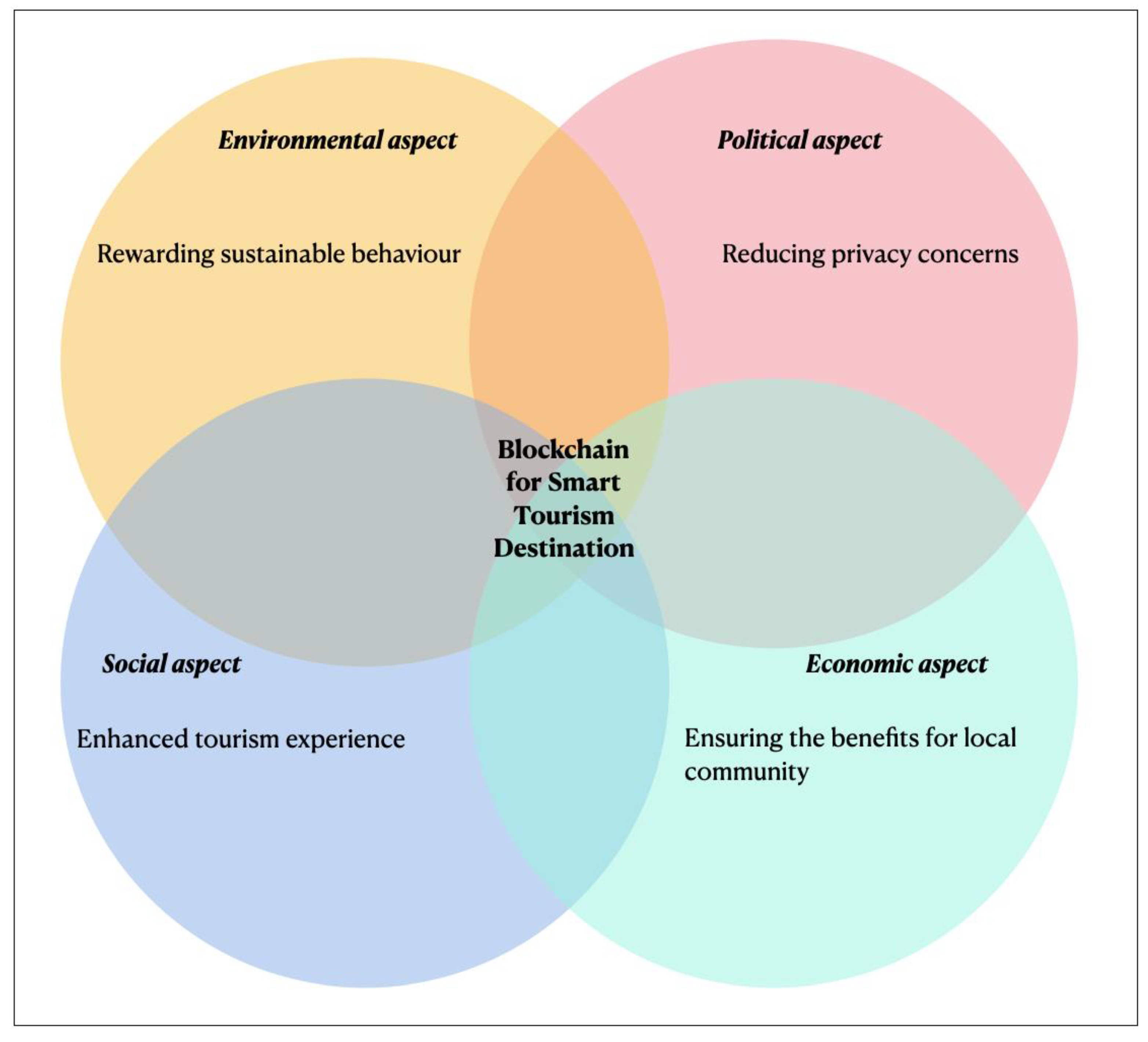Abstract
This conceptual paper discusses the potential of blockchain technology for Smart Tourism Destinations. The main focus is placed on Smart Tourism Destinations’ four major goals that can be achieved by using blockchain technology, namely: enhancing tourism experience, rewarding sustainable behaviour, ensuring benefits for local communities, and reducing privacy concerns. The paper also outlines the major challenges that need to be overcome to successfully implement this innovative technology. This paper attempts to further advance the current knowledge about the possible implications of blockchain technology within the smart tourism domain, and especially Smart Tourism Destinations.
1. Introduction
Over the last decade, the concept of ‘Smart Cities’ has gained enormous popularity that has resulted in the emergence of the topic of ‘Smart Tourism Destinations’ [1]. Smart Tourism Destinations widely use information and communication technologies (ICTs) and promise to gain a market advantage and positively contribute to sustainable tourism development by implementing sustainability initiatives [2,3]. Previous research highlights that three forms of ICTs, Cloud Computing, Internet of Things, and End-User Internet Service System, are of the highest importance for developing Smart Tourism Destinations [4].
Smart Tourism Destinations need to provide a technological platform through which all tourism data could be exchanged among all stakeholders [1]. Real-time information sharing is crucial to all in Smart Tourism Destinations, however, because of the existing oligarchy of global distribution system providers, small and local tourism businesses do not have access to data. This problem causes additional costs for the users, (both tourists and small tourism businesses), and enables providers to control prices [5]. Smart Tourism Destinations also face challenges regarding privacy issues and struggle to find a solution to hide tourists’ real identities [1]. An emerging cutting-edge technology, blockchain, may be used to address these challenges and assist in the development of Smart Tourism Destinations. However, there is limited research on possible effects of blockchain within the smart tourism domain, and especially Smart Tourism Destinations. The authors of [6] discussed the possible links of blockchain technology with smart and sustainable tourism and made theoretical propositions on future development of this technology in the tourism industry. The authors of [5] conducted an explorative study to investigate how blockchain technology had been implemented within the context of smart tourism.
To further academic debate around blockchain technology in smart tourism contexts, this conceptual paper aims to shed light on the potential of blockchain technology in Smart Tourism Destinations. Despite an increasing interest in blockchain in the global market, the role of blockchain technology in enabling Smart Tourism Destinations has not been explored yet. As such, this paper attempts to contribute to and expand the existing literature about blockchain in tourism by discussing how blockchain technology can help Smart Tourism Destinations achieve their major goals and address privacy issues. The remainder of the paper is organised as follows. The second section provides introductory definitions and explanations about Smart Tourism Destinations and blockchain technology. The third section discusses the potential role of blockchain technology in achieving goals pursued by Smart Tourism Destinations as well as the possible challenges of blockchain implementation in Smart Tourism Destinations. Finally, the last section of the paper highlights implications and proposes avenues for future research.
2. Literature Review
2.1. Smart Tourism Destinations
Smart tourism phenomena have emerged as a novel approach to tackle new realities in tourism caused by the impact of the innovative information and communication technologies (ICTs) over the destinations, travellers, and businesses [7]. Within the smart tourism research domain, the Smart Tourism Destinations have received the most attention. Previous research conceptualised the framework for Smart Tourism Destinations based on the development of smart cities [1], explored the potential of Smart Tourism Destinations to enhance tourists’ experience through personalisation of services [8], developed a conceptual model for Smart Tourism Destination competitiveness [9], and examined the effects of smart destination strategy and solutions on the destination management processes and tourism experience [10].
The concept of Smart Tourism Destination can be understood as a relevant contribution to the very concept of tourism destination [11], as well as a potential framework to manage the destinations [12]. Additionally, the concept is especially crucial for the destinations with one dominant attraction or with numerous attractions, where it is difficult to make marketing connections [9]. The main aim of Smart Tourism Destinations is enhancing tourism experience and improving the effectiveness of resource management towards both destination competitiveness and tourists’ satisfaction, as well as ensuring sustainability over an extended period of time [1].
There is no unique definition of a Smart Tourism Destination. Exploring the concept, the researchers define and conceptualise the term in different ways, however, most of them primarily emphasis the role of ICTs. For instance, the authors of [13] argues that Smart Tourism Destinations are destinations that apply different ICTs when developing and producing the tourism processes. In their first attempt to conceptualise Smart Tourism Destinations, the authors of [1] put the emphasis on the interconnection of different stakeholders in a destination through ICTs. The authors of [14] argue that the real meaning of Smart Tourism Destinations is to focus and take care of tourists’ needs using ICTs, with the aim of promoting tourism service quality and improving tourism management. Furthermore [15], defines Smart Tourism Destinations as places that use available technologies in order to co-create value, pleasure, and experiences for tourists as well as provide benefits and profits for the tourism organisations and destination. Additionally, the literature regarding Smart Tourism Destinations characterises them as destinations that intensively collect and use data to understand tourists’ needs and behaviour, to eventually provide better services and experiences in a more real-time and context-aware form [16,17]. It is argued that the development of Smart Tourism Destinations would benefit the tourism industry by enabling open access to data for both tourism organisations and tourists through a common platform [18,19].
Overall, Smart Tourism Destinations differ from traditional tourism destinations in their ability to encompass cutting-edge technologies and use large amounts of information to develop interconnections among stakeholders, smart decision-making, and finally provide enhanced tourism experiences and improved destination competitiveness [8,20,21]. Table 1 outlines several differences between a traditional tourism destination and a Smart Tourism Destination.

Table 1.
Differences between traditional and smart tourism destinations (based on [1,11,22]).
Some technologies are especially important for the development of Smart Tourism Destinations [9], as depicted in Table 2.

Table 2.
Examples of Smart Tourism Destinations and adopted ICTs.
Cloud computing, Internet of Things, and end-user internet service systems account for main values in interacting at all levels of stakeholder in the tourism context [23]. Blockchain technology may be another cutting-edge technology which can help address some challenges of data processing in Smart Tourism Destination [5].
2.2. Blockchain Technology
Blockchain is a new disruptive technology with improved ability to verify and record the exchange of assets among an interconnected set of users [24]. A blockchain can be considered as a disseminated database of records of all digital events that have been performed and shared among all participating members [25]. Blockchain technology enables a distributed peer-to-peer network, in which non-trusting members can verifiably interact with each other without a trusted authority [26].
Blockchain can be viewed as a set of interconnected mechanisms that provide specific features to the architecture, as depicted in Figure 1. At the lowest layer, there are signed transactions that are grouped into blocks [27]. The second layer, the consensus layer, is responsible for ensuring that all nodes agree on which transactions must be saved in the blockchain, to ensure the absence of corrupt branches and divergences [28]. The third layer, compute interface, is responsible for executing the smart contracts. Last, the governance layer extends the blockchain architecture to cover the human interactions in the physical world [27] and deals with how diverse actors join efforts to produce, maintain, and change the inputs that make up a blockchain [29].
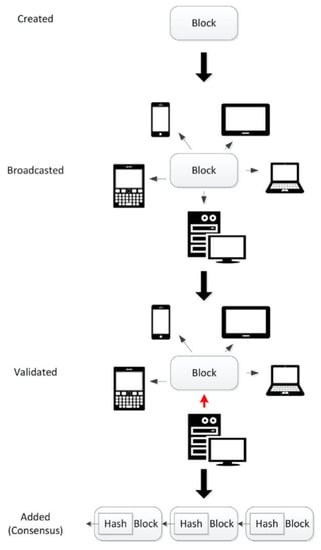
Figure 1.
A blockchain architecture [27].
Figure 2 demonstrates a typical blockchain process. When the transaction is made, a block appears. Then, the block is broadcast to all nodes in the network. One of the nodes validates the block and broadcasts it back to the network. If the block is verified, all nodes add it to their chain of blocks. Each following block correctly references the previous block. In this process, each transaction receives a unique sequence and timestamp. This guarantees more accuracy in data tracking [30]. Moreover, once the transaction is validated, it cannot be easily changed or deleted. Transparency is strengthened because the transactions are shared across the network, and everybody in the network can have access to data in due time. At the same time, this helps to ensure security and trigger trust [31].
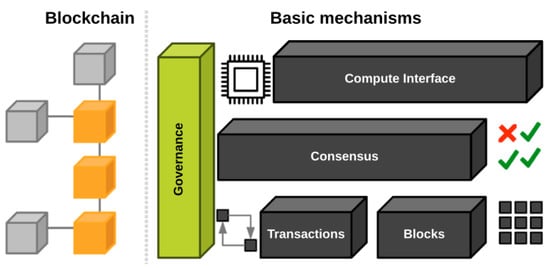
Figure 2.
A typical blockchain work flow [32].
The current literature argues that there are three generations of blockchain technology development [6]. The first generation is the development of Bitcoin, the first digital currency. The second generation is smart contracts, blockchain-based code that facilitate self-executing and self-enforcing contracts [33,34]. The third generation is the current technology characterised by DApps, which allow the users to interact with blockchain technology through smartphones or browsers.
According to the literature, there are three types of blockchains: public, private, and permissioned. Public blockchains are kept across peer-to-peer networks in a completely decentralised and anonymous manner, and anyone can join the network [35]. Private blockchains are characterised by the fact that only certain organisations can join the networks [36]. Permissioned blockchains require a set of trusted nodes responsible for creating the blocks, and only authorised organisations can join the network [36].
Due to blockchain technology’s specific features, the governments and organisations of different industries have started to develop blockchain platforms to assess and potentially integrate the technology into mainstream use [37]. The tourism industry also showed the intention to implement blockchain technology. Along with the big tourism companies applying blockchain technology to manage the distribution of inventories and assets, or facilitate payments, the academic interest in exploring the potential of this innovative technology in the tourism sector grows as well. Current research has examined the role of blockchains and cryptocurrencies in achieving tourism related sustainable development goals [38]. It has also explored the impacts of blockchain technology on the tourism industry from the lens of agency theory, transaction cost theory, a resource-based view of the firms, and actor network theory [39]. Additionally, research has focused on the blockchain’s potential for medical tourism [40]. Although most of the studies bear descriptive or conceptual character, several studies provide empirical evidence regarding the level of blockchain implementation in hospitality management [41] and the intention to use cryptocurrency by both travelers, and small and medium tourism businesses.
3. Blockchain for Smart Tourism Destination
The development of Smart Tourism Destinations needs to meet some requirements and faces several challenges. The Smart Tourism Destinations aim at enhancing travelers’ experience, providing a more intelligent platform for gathering and distributing information within the destinations, facilitating efficient distribution of tourism resources, and ensuring the benefits for local community [42]. Based on the previous literature, this section will discuss, from a holistic view of sustainability, the role of blockchain technology in contributing to the development of Smart Tourism Destinations through assisting the achievement of their main aims, precisely, enhancing tourism experience, rewarding sustainable behaviour, ensuring the benefits for local community, and reducing privacy concerns (Figure 3).
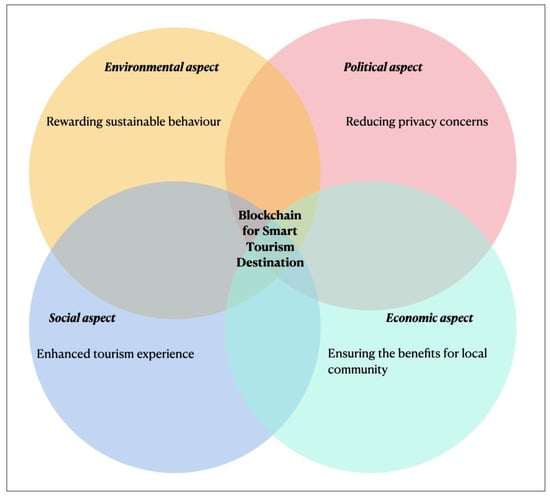
Figure 3.
Benefits of blockchain-enabled Smart Tourism Destination from a holistic view of sustainability.
3.1. Enhancing Tourism Experience
Smart Tourism Destinations aim at enhancing tourism experience through advance feedback loop, open access to real-time information, and better customer service, to address factors that potentially cause negative experiences (i.e., lost luggage, security concerns, delay, and long queues) [8]. To enhance tourism experience, Smart Tourism Destinations are expected to provide a number of personalised services, namely: providing all relevant real-time information based on user profiling to support planning phase before trip, ensuring access to real-time information to assist tourists in exploring the destination, and enabling a decent feedback system that allows the tourists to review their experiences [8]. Blockchain technology has a high potential to assist Smart Tourism Destinations in achieving their goals and providing personalised services.
First of all, because of its ability to build trust, ensure more secure information exchange, reduce costs, and enable transparency, blockchain technology can effectively remove the intermediaries and distribute similar powers to both providers and consumers of tourism services [43]. Along with major tourism businesses, small companies and local tourism service providers can offer their products and services within Smart Tourism Destinations. The tourists will receive real time information about all available tourism services and can access the authentic travel experiences that will possibly result in an enhanced tourism experience. Moreover, Smart Tourism Destinations can use blockchain technology for such guest services as tracking tourists, tracking luggage, managing lost luggage, providing fast check-in procedures, and facilitating travel insurance in case of flight delay or cancellation, therefore greatly enhancing the tourism experience [37]. Additionally, as blockchain-based cryptocurrencies enable simple, direct, and safe peer-to-peer transactions without the need for trusted third parties [44], some tourists may prefer to use cryptocurrency when paying for the tourism services in the Smart Tourism Destination [24]. Additionally, tourists can leave genuine reviews and ratings on their experiences in the blockchain embedded ranking and review systems and be sure that nobody can manipulate their reviews since blockchain technology can create a unique private key for each identity with several independent verification processes [44]. From the other side, other tourists that seek genuine and trustworthy reviews can gain benefits from such blockchain embedded review systems as well. Overall, blockchain technology is capable of providing more accurate and trustworthy information enabling personalised services, and therefore, enhancing the tourism experience and tourists’ satisfaction.
3.2. Rewarding Sustainable Behaviour
Sustainability is the main focus of Smart Tourism Destinations. Although blockchain technology itself raises questions regarding its sustainability in terms of high energy consumption, Smart Tourism Destinations can apply the technology for encouraging and rewarding sustainable behaviours of both tourists and residents. Some people do not pay much attention to the impacts their behaviour could have on the destinations’ environment, however incentives may positively change their attitudes and behaviours [45]. Implementing blockchain technology Smart Tourism Destinations can create a cryptocurrency-based reward system, which would allocate rewards to the tourists and residents with sustainable behaviours. Thus, it can be assumed that tourists who would be rewarded for their sustainable behaviour would be more likely, for example, to save water and energy in the accommodation premises, clear the beaches, collect plastic from the sea for established recycles centres to throw into special bins, or choose walking and biking over driving when at the destination. A cryptocurrency-based reward system would offer rewards to the residents who could achieve specified energy or water savings over a determined period of time, or would share their bikes with tourists [46]. The rewards could be used for purchasing certain goods and services, or investing into destinations’ infrastructure, boosting the local economy. Therefore, blockchain technology can favourably reshape the behaviours of both tourists and residents in the Smart Tourism Destination and contribute to its sustainability.
3.3. Ensuring the Benefits for Local Community
Addressing sustainability issues, Smart Tourism Destinations put emphasis on providing economic benefits to local communities. As mentioned in the previous section, by virtue of specific characteristics of blockchain technology embedded in Smart Tourism Destinations, local communities can have an equal access to open data as well as directly reach the tourists and offer them different tourism services and goods. Additionally, blockchain technology will enable diverse cryptocurrencies in Smart Tourism Destinations, allowing both tourists and locals the possibility to make payments in a secure and efficient way [6]. Moreover, local community can invent its own cryptocurrency and use it on local tourism market, thus boosting local economy.
3.4. Reducing Privacy Concerns
The Smart Tourism Destinations must provide open access of real-time information to all citizens and avoid vendor monopolies [47]. Meanwhile, some information about the tourists and their activities could be highly personal; which raises issues regarding privacy [48]. Especially within Smart Tourism Destinations, medical tourists may have higher concerns regarding their privacy [49]. Despite enabling facilitation of the recall of information on medical procedures and details, the use of innovative ICTs by Smart Tourism Destinations can aggravate medical tourists’ privacy concerns and create distrust. The destinations should apply different techniques for distorting data with the aim to avoid direct linkage between the tourists and their private information [1]. However, this approach faces another challenge in finding the right balance between information loss and disclosure risk [50]. Blockchain technology is capable of addressing these challenges, as it is regarded as a ‘privacy-by-design’ solution for many privacy issues resulting from digitisation of tourists’ information [51]. Privacy and data protection mechanisms are built in the blockchain system from the inception of the system’s design [40]. With the use of blockchain-based digital ID, the tourists have more control over their personal information and decide themselves which information, and with whom, they want to share [44]. The control and ownership over data reduces tourists’ privacy concerns as the tourists are aware of the flow and use of their personal information [52].
4. Key Challenges to Overcome
Despite promising benefits, the adoption of blockchain technology in Smart Tourism Destinations could face several challenges. First, blockchain technology’s conceptual complexity and excessive market novelty impose the biggest challenge towards its adoption by Smart Tourism Destinations [53]. Some tourism organisations and tourism service providers are not ready to implement the technology because of lack of expertise and knowledge about this new disruptive technology [41]. Tourists’ understanding about the technology and the availability of the merchants implementing blockchain technology is more important than technology efficiency or ease of use [54]. The use of blockchain systems by tourists and residents within Smart Tourism Destinations are limited to those who are tech-savvy and knowledgeable about its mechanism [55]. Therefore, Smart Tourism Destination managers and policy-makers must provide expert training and industry workshops on blockchain technology use in order to facilitate knowledge sharing, enhance business agility, promote business innovation, and educate both tourists and residents.
Other challenges are related to security concerns and lack of awareness regarding data security [56]. Among the barriers that need to be addressed are: potential hacks, identity theft, loss of private keys, misplacement of tokens, and safeguarding the privacy of personal records [57]. Additionally, due to blockchains’ characteristics, it is almost impossible to cancel or reverse the realised transactions, thus there is no recourse for mistakes [55]. Though blockchain technology intends to reduce corruption and collusion, it could be used for money laundering [58].
Further challenges that would confront the adoption of blockchain technology in Smart Tourism Destinations are related to the cost of its operation [59] and energy consumption. While Smart Tourism Destinations aim at providing equal benefits for all stakeholders including local businesses, operating blockchain technology like Bitcoin is currently considered unprofitable, especially for small scale business ventures [60]. Moreover, ensuring privacy and security of blockchain transactions as well as cryptocurrency mining demand a lot of energy [61]. It has been argued that blockchain technology can consume more electricity than some countries [62].
5. Conclusions
This paper has conceptualised the role that blockchain technology can play within smart tourism with special focus on supporting the achievement of the main goals of Smart Tourism Destinations. Given the highly competitive and innovative trends confronting tourism destinations, blockchain technology may present a viable solution to enhance tourism experience, reward sustainable behaviour, ensure benefits for local communities, as well as reduce privacy concerns. Nevertheless, it needs to be mentioned that this paper does not aim to diminish the role of other innovative technologies, but argues that combining blockchain technology with such technologies as Internet of Things or artificial intelligence will foster the development of Smart Tourism Destinations and positively contribute to their goals.
Also, given the limited research on potential impacts of blockchain technology, the paper has advanced current knowledge in the domain of applying blockchain systems to assist Smart Tourism Destinations. Blockchain technology can change the way data are being collected, validated, owned, and managed to co-create value [39]. Blockchain technology allows an equal, open access to data for small and medium enterprises as well as enables tourists to own and control their data.
Additionally, the paper has outlined the major challenges that Smart Tourism Destinations need to overcome to successfully implement blockchain technology. Knowing about risks related to blockchain adoption, the managers of Smart Tourism Destinations can come to a more reasonable decision whether to invest in this technology or not, and make efforts to protect the interests of all stakeholders.
While this paper has shed some light on the possible implications of blockchain technology for Smart Tourism Destinations, it bears some limitations. First, this study did not provide a critical discussion of blockchain technology itself as the main aim of the research was to explore positive benefits of the technology and downsides were out of the scope of this study. Second, this study theoretically elaborated on the benefits of blockchain, so case studies and empirical data are needed to test and confirm the propositions and further generate more in-depth understanding of the potentials of blockchain technology within the smart tourism domain. Future studies may conduct surveys among tourists and residents to assess and validate the impacts of blockchain technology on enhancing tourism experience and rewarding sustainable behaviour within a particular Smart Tourism Destination, or compare the results obtained from several Smart Destinations. In addition, the researchers may further extend the propositions of this study by exploring other possible areas within Smart Tourism Destinations that can be influenced by blockchain implementation.
Author Contributions
Conceptualization, I.T.; writing—original draft preparation, I.T.; writing—review and editing, I.T., M.I.Y., A.G.-P.; supervision, M.I.Y., A.G.-P. All authors have read and agreed to the published version of the manuscript.
Funding
University of Malaga.
Conflicts of Interest
The authors declare no conflict of interest.
References
- Buhalis, D.; Amaranggana, A. Smart Tourism Destinations. In Information and Communication Technologies in Tourism 2014; Xiang, Z., Tussyadiah, I., Eds.; Springer: Cham, Switzerland, 2013; pp. 553–564. [Google Scholar]
- Ratten, V.; Braga, V.; Álvarez-García, J.; Del Río, M.D.L.C. (Eds.) Tourism Innovation: Technology, Sustainability and Creativity; Routledge: New York, NY, USA, 2019. [Google Scholar]
- Gretzel, U.; Sigala, M.; Xiang, Z.; Koo, C. Smart tourism: Foundations and developments. Electron. Mark. 2015, 25, 179–188. [Google Scholar] [CrossRef]
- Zhang, L.; Li, N.; Liu, M. On the Basic Concept of Smarter Tourism and Its Theoretical System. Tour. Trib. 2012, 5, 66–73. [Google Scholar]
- Korže, S.Z. How Smart Tourism Embrace Blockchains and Smart Contracts. Mednar. Inov. Posl. J. Innov. Bus. Manag. 2019, 11, 32–40. [Google Scholar]
- Nam, K.; Dutt, C.S.; Chathoth, P.; Khan, M.S. Blockchain technology for smart city and smart tourism: Latest trends and challenges. Asia Pac. J. Tour. Res. 2019, 1–15. [Google Scholar] [CrossRef]
- Koo, C.; Park, J.; Lee, J.-N. Smart tourism: Traveler, business, and organizational perspectives. Inf. Manag. 2017, 54, 683–686. [Google Scholar] [CrossRef]
- Buhalis, D.; Amaranggana, A. Smart Tourism Destinations Enhancing Tourism Experience through Personalisation of Services. In Information and Communication Technologies in Tourism 2015; Tussyadiah, I., Inversini, A., Eds.; Springer: Cham, Switzerland, 2015; pp. 377–389. [Google Scholar]
- Koo, C.; Shin, S.; Gretzel, U.; Hunter, W.C.; Chung, N. Conceptualization of smart tourism destination competitiveness. Asia Pac. J. Inf. Syst. 2016, 26, 561–576. [Google Scholar] [CrossRef]
- Femenia-Serra, F.; Ivars-Baidal, J.A. Do Smart Tourism Destinations Really Work? The Case of Benidorm. Asia Pac. J. Tour. Res. 2018, 1–20. [Google Scholar] [CrossRef]
- Jovicic, D.Z. From the traditional understanding of tourism destination to the smart tourism destination. Curr. Issues Tour. 2017, 22, 276–282. [Google Scholar] [CrossRef]
- Ivars, J.A.; Celdrán, M.A.; Mazón, J.; Perles, Á. Towards an ICT Roadmap for Smart Tourism Destinations Based on Prospective Analysis. E-Rev. Tour. Res. 2017, 8, 1–5. [Google Scholar]
- Wang, D.; Li, X.; Li, Y. China’s smart tourism destination initiative: A taste of the service-dominant logic. J. Destin. Mark. Manag. 2013, 2, 59–61. [Google Scholar] [CrossRef]
- Huang, X.-k.; Yuan, J.-z.; Shi, M.-y. Condition and key issues analysis on the smarter tourism construction in China. In Multimedia and Signal Processing; Springer: Berlin/Heidelberg, Germany, 2012; pp. 444–450. [Google Scholar]
- Boes, K.; Buhalis, D.; Inversini, A. Conceptualising Smart Tourism Destination Dimensions. In Information and Communication TechNologies in Tourism; Springer: Cham, Switzerland, 2015; pp. 391–403. [Google Scholar]
- Choe, Y.; Fesenmaier, D.R. The Quantified Traveler: Implications for Smart Tourism Development. In Analytics in Smart Tourism Design; Xiang, Z., Fesenmaier, D.R., Eds.; Springer: Cham, Switzerland, 2017; pp. 65–77. [Google Scholar]
- Xiang, Z.; Fesenmaier, D.R. Big Data Analytics, Tourism. In Analytics in Smart Tourism Design; Xiang, Z., Fesenmaier, D.R., Eds.; Springer: Cham, Switzerland, 2017; pp. 299–307. [Google Scholar]
- Zhu, W.; Zhang, L.; Li, N. Challenges, Function Changing of Government and Enterprises in Chinese Smart Tourism; IFITT: Dublin, Ireland, 2014. [Google Scholar]
- Jasrotia, A.; Gangotia, A. Smart cities to smart tourism destinations: A review paper. J. Tour. Intell. Smartness 2018, 1, 47–56. [Google Scholar]
- Boes, K.; Buhalis, D.; Inversini, A. Smart tourism destinations: Ecosystems for tourism destination competitiveness. Int. J. Tour. Cities 2016, 2. [Google Scholar] [CrossRef]
- Wang, X.; Li, X.R.; Zhen, F.; Zhang, J. How smart is your tourist attraction? Measuring tourist preferences of smart tourism attractions via a FCEM-AHP and IPA approach. Tour. Manag. 2016, 54, 309–320. [Google Scholar] [CrossRef]
- Ruhanen, L. Stakeholder Participation in Tourism Destination Planning another Case of Missing the Point? Tour. Recreat. Res. 2009, 34, 283–294. [Google Scholar] [CrossRef]
- Gretzel, U.; Werthner, H.; Koo, C.; Lamsfus, C. Conceptual foundations for understanding smart tourism ecosystems. Comput. Hum. Behav. 2015, 50, 558–563. [Google Scholar] [CrossRef]
- Camilleri, M.A. The use of data-driven technologies for customer-centric marketing. Int. J. Big Data Manag. 2020, 1, 50–63. [Google Scholar] [CrossRef]
- Crosby, M.; Pattanayak, P.; Verma, S.; Kalyanaraman, V. Blockchain technology: Beyond Bitcoin. Appl. Innov. 2016, 2, 6–9. [Google Scholar]
- Christidis, K.; Devetsikiotis, M. Blockchains and smart contracts for the internet of things. IEEE Access 2016, 4, 2292–2303. [Google Scholar] [CrossRef]
- Casino, F.; Dasaklis, T.K.; Patsakis, C. A systematic literature review of blockchain-based applications: Current status, classification and open issues. Telemat. Inform. 2019, 36, 55–81. [Google Scholar] [CrossRef]
- Vukolić, M. The quest for scalable blockchain fabric: Proof-of-work vs. BFT replication. In International Workshop on Open Problems in Network Security; Springer: Cham, Switzerland, 2015; pp. 112–125. [Google Scholar]
- Oxford Internet Institute. Understanding Public Blockchain Governance. Available online: https://www.oii.ox.ac.uk/blog/understanding-public-blockchain-governance/ (accessed on 1 October 2020).
- Seffinga, J.; Lyons, L.; Bachman, A. The Blockchain (R)evolution—The Swiss Perspective; Deloitte: Zürich, Switzerland, 2017. [Google Scholar]
- Queiroz, M.M.; Wamba, S.F. Blockchain adoption challenges in supply chain: An empirical investigation of the main drivers in India and the USA. Int. J. Inf. Manag. 2019, 46, 70–82. [Google Scholar] [CrossRef]
- Banerjee, M.; Lee, J.; Choo, K.K.R. A blockchain future for internet of things security: A position paper. Digit. Commun. Netw. 2018, 4, 149–160. [Google Scholar] [CrossRef]
- Boucher, P.; Nascimento, S.; Kritikos, M. How blockchain technology could change our lives. In European Parliamentary Research Service, Scientific Foresight Unit; European Parliament: Brussels, Belgium, 2017; pp. 1–28. [Google Scholar]
- Coin Insider. What Are the Three Generations of Blockchain, and How Are They Similar to the Web? Available online: https://www.coininsider.com/three-generations-of-Blockchain/ (accessed on 16 September 2020).
- Nakamoto, S. Bitcoin: A Peer-to-Peer Electronic Cash System; BN Publishing: New York, NY, USA, 2008. [Google Scholar]
- Gao, Z.; Fan, Y.; Wu, C.; Zhang, J.; Chen, C. DSES: A Blockchain-Powered Decentralized Service Eco-System. In Proceedings of the IEEE 11th International Conference on Cloud Computing (CLOUD), San Francisco, CA, USA, 2–7 July 2018; pp. 25–32. [Google Scholar]
- Dogru, T.; Mody, M.; Leonardi, C. Blockchain Technology & Its Implications for the Hospitality Industry; Boston University: Boston, MA, USA, 2018; pp. 1–12. [Google Scholar]
- Tham, A.; Sigala, M. Road block (chain): Bit (coin) s for tourism sustainable development goals? J. Hosp. Tour. Technol. 2020, 11, 203–222. [Google Scholar] [CrossRef]
- Treiblmaier, H.; Önder, I. The impact of blockchain on the tourism industry: A theory-based research framework. In Business Transformation through Blockchain; Palgrave Macmillan: Cham, Switzerland, 2019; pp. 3–21. [Google Scholar]
- Rejeb, A.; Keogh, J.G.; Treiblmaier, H. The Impact of Blockchain on Medical Tourism. In Proceedings of the WeB2019 Workshop on e-Business, Munich, Germany, 14 December 2019. [Google Scholar]
- Flecha-Barrio, M.D.; Palomo, J.; Figueroa-Domecq, C.; Segovia-Perez, M. Blockchain Implementation in Hotel Management. In Information and Communication Technologies in Tourism; Springer: Cham, Switzerland, 2020; pp. 255–266. [Google Scholar]
- China Economic Net. Available online: http://en.ce.cn/Insight/201204/12/t20120412_23235803.shtml (accessed on 16 September 2020).
- Filimonau, V.; Naumova, E. The blockchain technology and the scope of its application in hospitality operations. Int. J. Hosp. Manag. 2020, 87, 1–8. [Google Scholar] [CrossRef]
- Kizildag, M.; Dogru, T.; Zhang, T.C.; Mody, M.A.; Altin, M.; Ozturk, A.B.; Ozdemir, O. Blockchain: A paradigm shift in business practices. Int. J. Contemp. Hosp. Manag. 2019, 32, 953–975. [Google Scholar] [CrossRef]
- Negruşa, A.L.; Toader, V.; Sofică, A.; Tutunea, M.F.; Rus, R.V. Exploring gamification techniques and applications for sustainable tourism. Sustainability 2015, 7, 11160–11189. [Google Scholar] [CrossRef]
- Scekic, O.; Nastic, S.; Dustdar, S. Blockchain-supported smart city platform for social value co-creation and exchange. IEEE Internet Comput. 2018, 23, 19–28. [Google Scholar] [CrossRef]
- Zygiaris, S. Smart city reference model: Assisting planners to conceptualize the building of smart city innovation ecosystems. J. Knowl. Econ. 2013, 4, 217–231. [Google Scholar] [CrossRef]
- Vanolo, A. Smartmentality: The smart city as disciplinary strategy. Urban Stud. 2013, 1–16. [Google Scholar] [CrossRef]
- Singh, N. Exploring the factors influencing the travel motivations of US medical tourists. Curr. Issues Tour. 2013, 16, 436–454. [Google Scholar] [CrossRef]
- Martínez-Ballesté, A.; Pérez-Martínez, P.A.; Solanas, A. The pursuit of citizens’ privacy: A privacy-aware smart city is possible. IEEE Commun. Mag. 2013, 51, 6. [Google Scholar] [CrossRef]
- Benchoufi, M.; Ravaud, P. Blockchain technology for improving clinical research quality. Trials 2017, 18, 335. [Google Scholar] [CrossRef] [PubMed]
- Milne, G.R. Privacy and ethical issues in database/interactive marketing and public policy: A research framework and overview of the special issue. J. Public Policy Mark. 2000, 19, 1–6. [Google Scholar] [CrossRef]
- Gatteschi, V.; Lamberti, F.; Demartini, C.; Pranteda, C.; Santamaría, V. Blockchain and smart contracts for insurance: Is the technology mature enough? Future Internet 2018, 10, 20. [Google Scholar] [CrossRef]
- Leung, D.; Dickinger, A. Use of Bitcoin in online travel product shopping: The European perspective. In Information and Communication Technologies in Tourism; Springer: Cham, Switzerland, 2017; pp. 741–754. [Google Scholar]
- Kwok, A.O.; Koh, S.G. Is blockchain technology a watershed for tourism development? Curr. Issues Tour. 2019, 22, 2447–2452. [Google Scholar] [CrossRef]
- Lin, I.; Liao, T. A survey of blockchain security issues and challenges. Int. J. Netw. Secur. 2017, 19, 653–659. [Google Scholar]
- Swan, M. Blockchain: Blueprint for a New Economy; O’Reilly Media, Inc.: Sebastopol, CA, USA, 2015. [Google Scholar]
- Ross, E. Nobody puts blockchain in a corner: The disruptive role of blockchain technology in the financial services industry and current regulatory issues. Cathol. Univ. J. Law Technol. 2017, 25, 353–386. [Google Scholar]
- Karame, G.; Androulaki, E. Bitcoin and Blockchain Security; Artech House: London, UK, 2016. [Google Scholar]
- Buy Bitcoin Worldwide. Available online: https://www.buybitcoinworldwide.com/mining/profitability/ (accessed on 13 October 2020).
- Li, J.; Li, N.; Peng, J.; Cui, H.; Wu, Z. Energy consumption of cryptocurrency mining: A study of electricity consumption in mining cryptocurrencies. Energy 2019, 168, 160–168. [Google Scholar] [CrossRef]
- BBC News. Available online: https://www.bbc.com/news/technology-48853230 (accessed on 4 October 2020).
Publisher’s Note: MDPI stays neutral with regard to jurisdictional claims in published maps and institutional affiliations. |
© 2020 by the authors. Licensee MDPI, Basel, Switzerland. This article is an open access article distributed under the terms and conditions of the Creative Commons Attribution (CC BY) license (http://creativecommons.org/licenses/by/4.0/).

